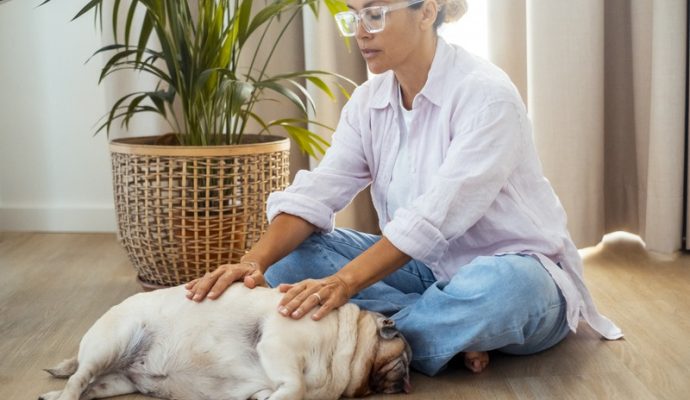Caring for pets is a loving journey from active youth to calm old age. As pets age, their health and happiness must change, requiring special attention. Geriatric care is crucial for maintaining their quality of life in their later years. Knowing when and how to provide this care is essential for pet owners. This guide will explore the right timing and methods for looking after our elderly pets.
Recognizing the Onset of Old Age in Pets
Before looking into the specifics of geriatric care, it’s vital to recognize when your pet officially becomes a ‘senior.’ The aging process varies remarkably across different species and breeds. For instance, large dog breeds tend to enter their senior years earlier than smaller breeds. Generally, cats and small to medium dogs are considered senior at around seven years of age, while larger breed dogs reach this stage at around six years old.
Signs that your pet is entering their golden years include:
-
Decreased activity levels
-
Visible graying around the muzzle or face
-
More frequent naps
-
Changes in weight (gain or loss)
-
Signs of joint stiffness or difficulty moving
When to Start Geriatric Care
Observing aging signs in pets warrants proactive geriatric care to maintain their well-being. Starting care as they enter their senior years, varying by size and breed, isn’t about imminent decline but preservation.
Geriatric pet care emphasizes the importance of updated vaccinations, which are vital for disease protection in older pets. Veterinarians offer tailored advice on necessary pet vaccinations for senior animals, ensuring their health in their golden years.
Key Components of Geriatric Care for Pets
Geriatric care for pets encompasses a broad range of practices designed to monitor and maintain their health as they age. Some of these include:
-
Regular veterinary check-ups: Senior pets require more frequent vet visits, typically every six months.
-
Diet and nutrition adjustments: Senior pets have different nutritional requirements, often needing diets lower in calories but higher in fiber, with adequate protein levels.
-
Increased focus on dental health: Aging pets are more prone to dental issues, making regular dental care necessary.
-
Mobility assistance: As pets age, they might need help getting around. This can include ramps, orthopedic beds, and joint supplements.
-
Mental stimulation: Maintaining mental agility is crucial for aging pets through activities like puzzle toys or simple training exercises.
Vital Health Checks and Preventative Measures
In addition to preventive vaccines, routine diagnostic tests become increasingly important. Visits to a veterinary lab in Stanwood, WA, or a similar facility can help identify issues early on. These labs offer a range of tests specifically catered to the needs of senior pets, from bloodwork to check for internal organ function to X-rays or ultrasounds to examine their bones and organs for any signs of disease.
Emotional and Psychological Support
Beyond physical health, aging pets’ emotional and psychological well-being is paramount. Senior pets may exhibit signs of anxiety or depression, often stemming from pain or the loss of sensory capabilities. Providing a comfortable, stress-free environment and plenty of love and attention can play a significant role in maintaining their happiness and overall quality of life.
Understanding the Special Needs of Senior Pets
Special considerations must be considered when care is focused on senior pets. A geriatric dog, in particular, faces various challenges as they age, such as increased risk of heart disease, kidney disease, and vision or hearing impairment. A comprehensive approach to their care, including regular health screenings, dietary management, and accommodations for decreased mobility or sensory impairments, can significantly improve their comfort and well-being during their senior years.
Nutrition and Exercise for Senior Pets
-
Nutrition: As pets age, their metabolic rate slows down. Feeding them a diet formulated for senior pets can help them manage weight and provide the essential nutrients they need.
-
Exercise: Keeping geriatric pets active is crucial for physical and mental health. The intensity and type of activity should be adjusted to suit their health and mobility levels.
Working with Your Veterinarian
A crucial part of pet geriatric care is forming a solid partnership with your veterinarian. They can offer invaluable advice tailored to your pet’s health needs and circumstances.
As part of senior care, regular check-ups allow your vet to monitor your pet’s health closely and adjust their care plan as needed. From diet and exercise recommendations to managing chronic conditions, your veterinarian is your best ally in ensuring your pet’s golden years are as golden as possible.
Wrapping Up
Starting to care for older pets means changing how we look after them to keep them happy and healthy. As pets age, we must change what we do daily and work closely with the vet to ensure they’re comfortable. Even though they’re aging, it doesn’t mean we love or care for them any less. Instead, it’s a chance to make sure their later years are full of happiness and love, making the most of our time with them.




